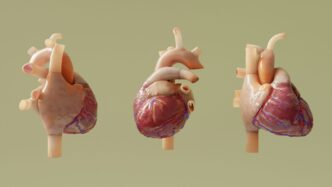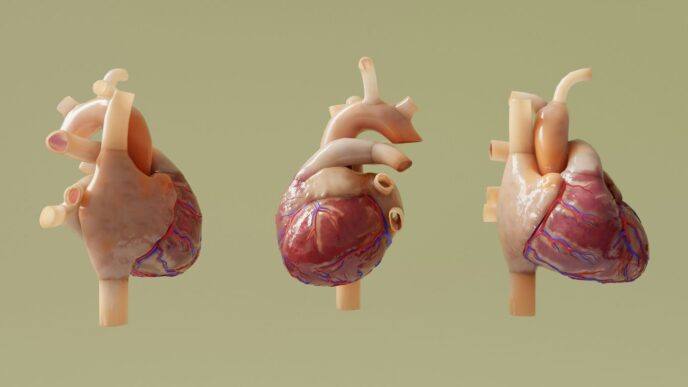Getting a breast cancer diagnosis can feel like your world is turned upside down. It’s a lot to take in, and honestly, figuring out what comes next can be overwhelming. But you’re not alone in this. There are so many resources and people out there ready to help you through every step, aiming for a future where breast cancer is no longer a threat. This information is here to offer some clarity and a sense of hope on your path toward becoming breast cancer-free.
Key Takeaways
- Understand the different types of breast cancer, including the specific challenges of triple-negative breast cancer, and prepare for the emotional toll a diagnosis can bring.
- Actively participate in your treatment by asking questions and exploring options like clinical trials, while also learning how to manage treatment side effects.
- Find support through various networks, peer matching programs, and organizations that offer financial and legal help, guiding you through survivorship.
- Address changes in body image after procedures like mastectomy and explore reconstruction or prosthetic options, while also focusing on maintaining intimacy during and after treatment.
- Build a strong support system by connecting with others who share similar experiences and finding comfort and strength in community as you move towards a breast cancer-free life.
Understanding Your Breast Cancer Diagnosis
Getting a breast cancer diagnosis can feel like the ground has shifted beneath you. It’s a lot to take in, and honestly, it’s okay to feel overwhelmed. Let’s break down some of the key things you’ll encounter as you start this journey.
Navigating Different Types of Breast Cancer
Not all breast cancers are the same, and knowing the type is the first step. The main categories usually have to do with where the cancer started and how it behaves. You might hear terms like invasive ductal carcinoma (IDC) or invasive lobular carcinoma (ILC). IDC starts in the milk ducts and is the most common type. ILC begins in the milk-producing lobules. There are also non-invasive types, like ductal carcinoma in situ (DCIS), where the abnormal cells haven’t spread beyond the duct. Understanding these differences helps your medical team figure out the best treatment plan for you. Sometimes, dense breast tissue can make mammograms a bit trickier to read, kind of like trying to spot a polar bear in a snowstorm. If this is the case, your doctor might suggest other imaging tests like an MRI or ultrasound to get a clearer picture.
The Unique Challenges of Triple-Negative Breast Cancer
Triple-negative breast cancer (TNBC) is a specific type that can be more challenging. It means the cancer cells don’t have any of the three common receptors that are often targeted in treatment: estrogen receptors, progesterone receptors, and HER2 protein. Because these targets aren’t present, treatments like hormone therapy or HER2-targeted drugs don’t work. This often means chemotherapy is the primary treatment. While TNBC can be aggressive, research is ongoing, and new treatment approaches are being explored.
Preparing for the Emotional Impact of Diagnosis
Beyond the physical aspects, a diagnosis brings a wave of emotions. It’s completely normal to feel scared, angry, sad, or confused. You might also notice changes in your thinking or memory, sometimes called "chemobrain" if you’re undergoing chemotherapy. It’s important to talk about these feelings and any cognitive changes with your doctor. Don’t hesitate to be persistent; explain how these issues affect your daily life. Keeping a notebook to jot down important information or reminders can be really helpful. Remember, you don’t have to go through this emotional rollercoaster alone. Connecting with support groups or a counselor can make a big difference.
Empowering Your Treatment Journey
Getting a breast cancer diagnosis can feel like being thrown into a whirlwind. Suddenly, there’s a lot to learn and a lot of decisions to make, and it’s easy to feel overwhelmed. But remember, you’re not alone in this, and taking an active role in your treatment can make a big difference.
Asking Questions and Advocating for Yourself
It’s really important to speak up and ask questions. Don’t ever feel like you can’t. Your doctors and nurses are there to help you understand everything, but they can’t read your mind. If something isn’t clear, ask them to explain it again. It’s okay to ask the same question multiple times if you need to.
- Write down your questions before appointments. This way, you won’t forget them when you’re in the moment.
- Bring someone with you to appointments if you can. A friend or family member can help you remember what was said and ask questions you might have missed.
- Don’t be afraid to get a second opinion. It’s your health, and you have the right to feel confident about your treatment plan.
Understanding Treatment Side Effects
Treatments for breast cancer, like chemotherapy, radiation, or surgery, can come with side effects. These can range from mild annoyances to more serious issues. Knowing what to expect can help you prepare and manage them better.
Here are some common side effects and ways to cope:
- Fatigue: This is super common. Try to rest when you can, but also gentle movement like walking can sometimes help. Ask your care team about ways to manage it.
- Nausea: Many people experience nausea. There are medications that can help a lot. Don’t hesitate to ask your doctor for anti-nausea drugs.
- Hair Loss: This can be emotionally tough. Some people choose to wear wigs, scarves, or hats. Cold caps are also an option during some types of chemo to try and reduce hair loss.
- Mouth Sores: Keeping your mouth clean and using a soft toothbrush can help. Your doctor might suggest special mouthwashes.
It’s vital to talk to your medical team about any side effects you’re experiencing. They can offer solutions and adjust your treatment if needed.
Exploring Clinical Trial Opportunities
Clinical trials are research studies that test new treatments or new ways of using existing treatments. They can offer access to cutting-edge therapies that aren’t yet widely available. Participating in a trial is a personal choice, and it’s good to understand what’s involved.
- What are clinical trials? They are carefully designed studies to see if new medical approaches are safe and effective.
- Who can join? Each trial has specific rules, called eligibility criteria, about who can participate.
- What are the potential benefits? You might get access to a promising new treatment. You’ll also be contributing to medical knowledge that could help others.
- What are the risks? New treatments might have unknown side effects, and the treatment might not work for you.
Your doctor can tell you if there are any clinical trials that might be a good fit for your situation. It’s a way to potentially get advanced care while helping future patients.
Resources for a Breast Cancer-Free Future
It can feel like you’re all alone when you get a breast cancer diagnosis, but there are so many places ready to help. Finding the right support can make a big difference in how you get through treatment and beyond. It’s not just about medical care; it’s about having people and programs that understand what you’re going through.
Support Networks and Peer Matching Programs
Sometimes, just talking to someone who has been there can be incredibly helpful. Many organizations connect people with breast cancer to others who have similar experiences. These peer matching programs can link you up one-on-one with someone who understands the specific challenges you might be facing, whether it’s a particular type of breast cancer or a certain stage of treatment. It’s a way to share stories, get practical tips, and just feel less isolated. You can often find these programs through larger cancer support groups or foundations.
- Living Beyond Breast Cancer (LBBC): Offers a support line and can connect you with a peer who has also had breast cancer. You can reach them at 888-753-5222 or visit their website.
- SHARE: This organization supports women with breast and ovarian cancer and also provides peer matching. Their hotline is 866-891-2392.
- Triple Negative Breast Cancer Foundation: If you have triple-negative breast cancer, they offer supportive counseling and can be reached at (877) 880-TNBC (8622).
Financial Assistance and Legal Resources
Dealing with cancer often comes with unexpected costs, and it’s okay to seek help. There are organizations that can assist with medical bills, living expenses, and even legal matters. If you have dependents, you might be thinking about setting up legal documents like a trust to ensure their future. Some groups specialize in providing legal advice for cancer patients.
- Cancer Legal Resource Center (CLRC): This national program offers free information and can help with legal questions related to cancer, including setting up trusts for children.
- Going Beyond the Pink: This group, particularly active in Southeastern North Carolina, provides financial assistance for out-of-pocket medical costs and other support resources.
Navigating Survivorship and Beyond
Getting through treatment is a huge accomplishment, but the journey doesn’t end there. Survivorship involves adjusting to life after cancer, which can bring its own set of challenges and questions. Many resources focus on helping you manage long-term side effects, emotional well-being, and rebuilding your life. This can include workshops, educational materials, and ongoing support groups designed for survivors. The goal is to help you not just survive, but to thrive.
- Post-treatment check-ups: Regular follow-up appointments are key to monitoring your health.
- Rehabilitation services: Physical or occupational therapy can help with lingering physical issues.
- Mental health support: Counseling or support groups can help process the emotional impact of cancer.
Coping with Body Image and Intimacy

Going through breast cancer treatment can really mess with how you feel about yourself, and that’s totally understandable. It’s not just about the physical changes, but also the emotional toll. Your body might look different after surgery, or treatments like chemo can affect your energy and how you feel physically, which can impact intimacy. It’s a lot to deal with, and it’s okay to feel a mix of emotions about it.
Addressing Changes After Mastectomy
Losing a breast, whether it’s one or both, is a significant change. It’s natural to grieve this loss and feel unsure about how your body looks now. Many women find that focusing on what they still have, rather than what’s been lost, can be a helpful step. This might involve:
- Journaling: Writing down your thoughts and feelings can be a private space to process everything.
- Self-Appreciation: Take time to notice and appreciate other parts of yourself – your intelligence, your sense of humor, your kindness, or even physical features you still love.
- Small Pleasures: Treat yourself to things that bring you joy, like a new book, a relaxing bath, or a favorite scent.
Some women choose reconstruction to feel more like themselves again, while others find comfort in prostheses that can restore symmetry. There’s no right or wrong way to feel about these changes; it’s about finding what works for you.
Reconstruction Options and Alternatives
If you’re considering options to address changes after a mastectomy, there are a few paths you can explore. It’s good to know what’s out there, even if you’re not ready to decide right away.
- Breast Reconstruction: This involves using implants or your own tissue to rebuild the breast shape. It can be done at the time of mastectomy or later. Talking with a plastic surgeon can give you a clear picture of what’s involved.
- Prostheses: These are artificial breasts worn inside a bra. Modern prostheses are lightweight and come in various shapes and sizes, including options for swimwear.
- No Reconstruction: Many women choose not to have reconstruction and feel perfectly comfortable with their bodies as they are. This is also a valid and strong choice.
Each option has its own considerations, and what feels right is deeply personal.
Maintaining Intimacy During and After Treatment
Intimacy is about more than just physical closeness; it’s about connection, comfort, and shared affection. When treatments affect your body or energy levels, it’s natural for desire to change. Open and honest communication with your partner is key to navigating this.
- Talk About It: Share your feelings, fears, and needs with your partner. Let them know what feels good and what doesn’t. Remember, they might be feeling unsure too.
- Explore Different Forms of Intimacy: Intimacy isn’t limited to intercourse. Holding hands, cuddling, massage, or simply spending quality time together can strengthen your bond.
- Address Physical Changes: If vaginal dryness or discomfort is an issue due to treatment, talk to your doctor. There are often simple solutions that can make a big difference.
It takes time and patience to adjust to changes, both physically and emotionally. Be kind to yourself and to each other as you move forward together.
Building a Supportive Community
It can feel really isolating when you’re going through breast cancer treatment. You might feel like no one truly gets what you’re experiencing, and that’s completely understandable. But here’s the thing: you don’t have to go through this alone. Building a strong support system is a huge part of getting through this, and there are so many ways to find your people.
Finding Comfort in Shared Experiences
Sometimes, the best understanding comes from someone who’s walked a similar path. Connecting with other breast cancer patients and survivors can be incredibly validating. You can share fears, celebrate small victories, and just have someone who gets it without needing a long explanation. These connections can happen in a few ways:
- Support Groups: Many hospitals and cancer centers offer in-person or online support groups. These are structured meetings where you can talk openly.
- Peer Matching Programs: Some organizations pair you with a survivor who has gone through a similar diagnosis or treatment. It’s like having a guide who’s been there.
- Online Forums and Social Media: There are countless online communities where you can connect with others. Just be mindful of the information you share and consume.
The Importance of Community for Survivors
Once treatment ends, the journey isn’t over. Survivorship brings its own set of challenges, and a supportive community remains vital. It’s a place to process the experience, manage long-term side effects, and find a new sense of normal. Community can help you:
- Process emotions: Dealing with the aftermath of cancer can bring up a lot of feelings. Sharing these with others who understand can be very healing.
- Share practical tips: Survivors often have great advice on managing lingering side effects, lifestyle changes, or just day-to-day coping.
- Maintain hope: Seeing others thrive after cancer can be a powerful reminder that life goes on and can be fulfilling.
Organizations Dedicated to Breast Cancer Support
There are many wonderful organizations out there that focus on providing support and resources. They often run programs, offer financial aid, and connect people to the help they need. Here are just a few examples of the kinds of help available:
| Type of Support | Examples of Services |
|---|---|
| Direct Patient Aid | Financial assistance for medical bills, transportation, lodging during treatment. |
| Information & Ed. | Educational materials, workshops on treatment, survivorship, and emotional well-being. |
| Community Building | Support groups, peer matching, networking events, and advocacy opportunities. |
These groups often have dedicated staff or volunteers who can help you find exactly what you’re looking for. Don’t hesitate to reach out to them; they exist to help.
Hope and Resilience on the Path Forward

It’s easy to get caught up in the day-to-day of treatment, the appointments, the side effects, and just the sheer exhaustion of it all. But looking ahead, towards a future where breast cancer is no longer a threat, is so important. It’s about finding that spark of hope even when things feel really tough. This journey, while challenging, is also a testament to the incredible strength found within individuals and communities.
Stories of Strength from Survivors
Hearing from others who have walked this path can be incredibly powerful. These aren’t just stories; they’re blueprints for resilience. Many survivors talk about how connecting with others who truly get it made all the difference. They share how they found ways to laugh again, to find joy in small things, and to rebuild their lives after treatment. It’s about seeing that life doesn’t end with a diagnosis; it just takes a different turn.
Maintaining a Positive Outlook
Keeping a positive outlook isn’t about ignoring the hard stuff. It’s more about actively choosing where to focus your energy. For many, this means celebrating small victories – a good scan result, a day with less fatigue, or simply enjoying a quiet moment. It can also involve finding healthy ways to manage stress, like gentle exercise, mindfulness, or creative outlets. Sometimes, just remembering that you’re not alone and that there are people cheering you on can shift your perspective.
Celebrating Progress Towards a Breast Cancer-Free World
We’re living in a time of amazing advancements in breast cancer research and care. From new treatment options to better early detection methods, the progress being made is significant. It’s worth taking a moment to acknowledge these strides. Organizations worldwide are working tirelessly, and every bit of support, whether through donations, advocacy, or simply spreading awareness, contributes to this larger goal. The collective effort is what truly moves us closer to a future free from breast cancer.
Looking Ahead: A Future with Less Breast Cancer
It’s clear that facing breast cancer is incredibly tough, and no one should go through it alone. We’ve talked about a lot of resources, from support groups to places that can help with practical stuff like finances or just listening. Remember, the advice from those who’ve been there is gold. It’s not always easy, and sometimes things don’t go as planned, but there’s a whole community ready to help. Keep learning, keep asking questions, and know that there’s a lot of hope for a future where breast cancer isn’t such a big threat. You’ve got this.














